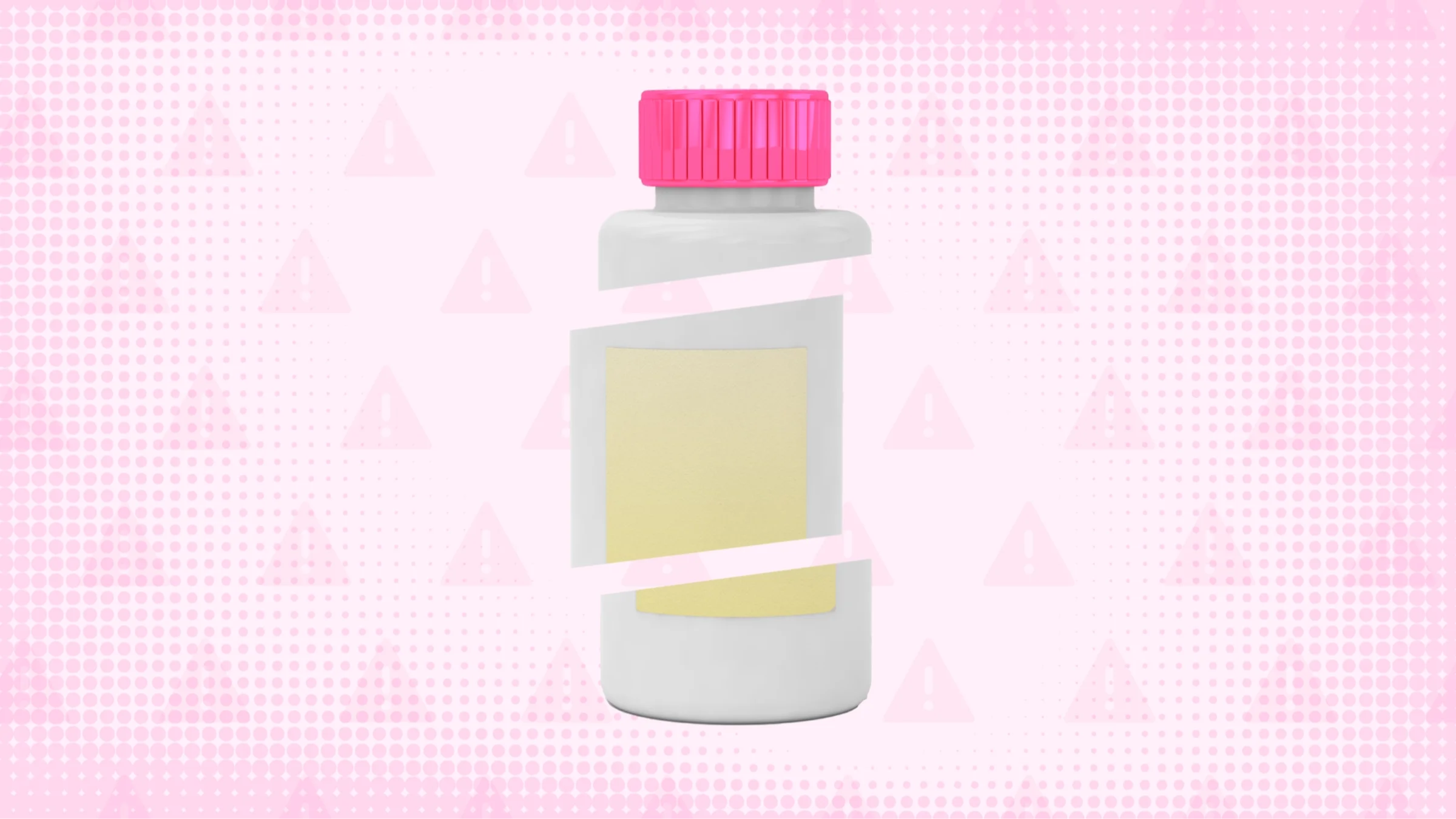Key takeaways:
Midol Complete is an over-the-counter (OTC) medication containing acetaminophen, caffeine, and pyrilamine maleate. It can help relieve many menstrual period symptoms, such as cramps and bloating.
Common Midol side effects include drowsiness, dizziness, and dry mouth. Constipation and blurry vision can also happen.
Rare but serious Midol side effects and risks include trouble urinating, liver damage, and allergic reactions. Seek medical help if you think you’re experiencing a severe side effect.
Save on related medications
Menstrual periods can cause many symptoms, with cramps being a very common one. But bloating, headache, and fatigue are also typical. If you’re looking for relief, you may be considering Midol, an over-the-counter (OTC) medication for menstrual symptoms.
Midol isn’t a single medication, but rather a line of OTC products. Of them, Midol Complete (acetaminophen / caffeine / pyrilamine) is a popular choice. The combination of medications in the product helps target the most common period symptoms.
As with any medication, there are a few side effects to consider with Midol Complete. Keep in mind that other Midol products may contain different ingredients. And their side effects may be different from what’s discussed here. Ask your pharmacist for more details on the specific medication you’re buying.
Note: Throughout this article, we’ll be focusing on Midol Complete. But for ease of reading, we’ll just use the term “Midol” when discussing the product.
Midol side effects at a glance
Here’s a quick list of Midol side effects. Most are mild, but there are a few rare, serious side effects to be aware of too.
Common and generally mild Midol side effects include:
Drowsiness
Dizziness
Dry mouth
Constipation
Blurry vision
Increased urination
Nervousness
Irritability
Faster heart rate
Temporary but small increases to blood pressure



Rare but serious Midol side effects and risks include:
Worsening glaucoma
Trouble urinating
Liver damage
Allergic reactions
Let’s take a closer look at nine Midol side effects and how you can manage them.
1. Drowsiness
Drowsiness is a commonly reported Midol side effect. But it’s typically short-lived and only lasts for a few hours after a dose. This side effect is due to pyrilamine, one of the ingredients in Midol pills.
Pyrilamine is an antihistamine. It blocks the activity of histamine, a naturally-occurring chemical believed to play a role in causing menstrual cramps. But pyrilamine works throughout the whole body, including in and around the brain. This can cause drowsiness.
Avoid combining Midol with other medications and substances that can cause drowsiness, such as other oral antihistamines and alcohol. Mixing them can lead to severe drowsiness.
If you find Midol makes you sleepy, try taking your dose close to bedtime. This can help reduce daytime drowsiness. If you need to take Midol during the day, avoid driving and other activities that require you to be alert until you see how it affects you. You can also try a different menstrual cramp medication that doesn’t have pyrilamine if drowsiness is too bothersome.
2. Dizziness
Another common Midol side effect is dizziness. This is also likely due to pyrilamine. But the caffeine component could also contribute to it. If you have other health conditions that cause dizziness, such as Ménière’s disease, Midol may worsen this symptom.
If you experience dizziness while taking Midol, there are a few steps to take. Start by finding somewhere to sit or lie down. This can help prevent you from falling if you lose your balance. Make sure you stay hydrated too. And eating something may also help relieve dizziness for some people.
This Midol side effect usually resolves once the medication wears off — about 4 to 6 hours after taking it. If you notice excessive or persistent dizziness, stop taking Midol and contact a healthcare professional.
3. Dry mouth
Dry mouth is another common Midol side effect caused by pyrilamine. Antihistamines like pyrilamine often cause anticholinergic side effects. These effects happen when a medication blocks acetylcholine in the body. Acetylcholine is an important chemical for the regulation of many body functions, including saliva production. Blocking it can cause dry mouth.
Like other side effects, dry mouth usually goes away on its own over time. Drinking more fluids and chewing sugar-free gum are two ways to help relieve dry mouth. Stopping Midol should resolve this side effect if these tips don’t help.
4. Constipation
Constipation is another possible Midol side effect. It’s also an anticholinergic side effect caused by pyrilamine. In some cases, less frequent bowel movements may be helpful if you tend to experience diarrhea during your period. But it can become bothersome, especially if stools are hard to pass. Constipation from Midol should let up after you stop taking the medication.
You can help relieve constipation by increasing your water and fiber intake. There are also OTC medications available for constipation, like laxatives and stool softeners. Let a healthcare professional know if your bowel movements aren’t back to normal after a few days.
5. Blurry vision
Less commonly, Midol can also cause blurry vision. This can raise your risk of falls or make driving unsafe. Many times, blurry vision is mild. But in rare cases, it could be a symptom of more serious eye problems.
Antihistamines, such as pyrilamine in Midol, can cause acute angle-closure glaucoma in people with certain types of glaucoma. Symptoms include blurry vision, severe eye pain, and seeing halos around bright lights. It doesn’t happen often, but this condition is serious and can result in permanent vision loss if you don’t get immediate treatment.
If you have a history of glaucoma, ask your eye care specialist if Midol is OK for you to take. And contact them right away if you think you’re having symptoms of acute angle-closure glaucoma.
Mild episodes of blurry vision should get better on their own. If you continue having blurry vision while taking Midol, you should stop taking it. If your blurry vision continues after that point, ask an eye doctor about next steps.
6. Changes to urination
Midol can cause changes to how you urinate (pee). Most commonly, this includes making you urinate more. But rarely, it may make it more difficult to urinate.
More urination
Midol pills contain caffeine, which can act as a mild diuretic (“water pill”). This can be helpful for relieving bloating. But it can make you urinate more often. This side effect is common and should only last until Midol starts wearing off. If you find it to be uncomfortable, ask your pharmacist about menstrual cramp products that don’t include a diuretic.
Trouble urinating
Trouble urinating (urinary retention) is an anticholinergic side effect of Midol. This may feel like you can’t fully empty your bladder. But it can also include pain or swelling in your lower stomach.
You may have a higher risk of trouble urinating if you have other health conditions, such as uterine fibroids. Your risk may also be higher if you take other medications that have this effect. Examples include muscle relaxers like cyclobenzaprine and certain antidepressants like amitriptyline.
If you have trouble urinating with Midol, stop taking it and contact a healthcare professional. Urinary retention can become serious and should always be evaluated.
7. Nervousness or irritability
Each recommended dose of Midol contains about as much caffeine as a cup of coffee. Even this amount of caffeine can cause nervousness and irritability for some people.
The good news is that nervousness or irritability should go away within a few hours of taking a dose. But it’s a good idea to limit the amount of caffeine you’re consuming from all sources while taking Midol. This can help keep this Midol side effect to a minimum.
8. Liver damage
Liver damage is a rare but serious Midol side effect that can be caused by the pain reliever acetaminophen in the product. Acetaminophen isn’t harmful when taken occasionally and when you follow the recommended dosages on the Midol label. But, acetaminophen can cause liver damage when taken in larger doses or chronically over a long period of time.
It can be easy to accidentally take too much acetaminophen, as it’s included in hundreds of prescription and OTC medications. Before taking Midol, ask your pharmacist to double-check your current medication list for possible interactions. You should also avoid alcohol while taking Midol. Combining alcohol and acetaminophen can raise the risk of liver damage.
If you believe you or someone you know has taken too much Midol, seek medical help. You can also call Poison Control at 1-800-222-1222 for guidance. In severe cases, treatment in a hospital may be needed to prevent liver failure.
9. Allergic reactions
Although very rare, the acetaminophen in Midol can cause severe allergic skin reactions. This includes potentially fatal skin reactions like Stevens-Johnson Syndrome and toxic epidermal necrolysis. These reactions can happen anytime, even if you’ve safely used acetaminophen products in the past.
Stop taking Midol and seek medical help right away if you experience skin reddening, blisters, or rash. A healthcare professional will need to evaluate your skin. And if you’ve had a skin reaction from acetaminophen in the past, avoid taking Midol and talk to your pharmacist about alternative OTC options that don’t contain acetaminophen.
Frequently asked questions
Midol pills can be taken by anyone 12 years and older, including men. But it’s important to read the OTC label when deciding if it’s the best medication to treat your symptoms. Be sure that only the symptoms you have are listed on the label. Ask your pharmacist for help if you’re unsure if Midol is a good choice.
Similar to a cup of coffee, the caffeine in Midol may raise your blood pressure by a small amount. This effect is temporary and should wear off in a few hours. But if you’ve been advised to limit caffeinated beverages, you should talk to a healthcare professional before taking Midol.
The caffeine in Midol pills helps relieve period fatigue and bloating caused by water retention. Caffeine is a mild stimulant that can boost your energy levels. It’s also a weak diuretic that can help you urinate out extra water and feel less bloated.
Midol pills can be taken by anyone 12 years and older, including men. But it’s important to read the OTC label when deciding if it’s the best medication to treat your symptoms. Be sure that only the symptoms you have are listed on the label. Ask your pharmacist for help if you’re unsure if Midol is a good choice.
Similar to a cup of coffee, the caffeine in Midol may raise your blood pressure by a small amount. This effect is temporary and should wear off in a few hours. But if you’ve been advised to limit caffeinated beverages, you should talk to a healthcare professional before taking Midol.
The bottom line
Common Midol side effects include drowsiness, dizziness, and dry mouth. Constipation, blurry vision, and nervousness are also possible. Serious Midol side effects and risks include trouble urinating, liver damage, and allergic reactions. Check with a healthcare professional before taking Midol to make sure it’s safe for you.

Why trust our experts?


References
Bayer HealthCare LLC. (2023). Midol complete- acetaminophen, caffeine, and pyrilamine maleate tablet [package insert]. DailyMed.
Kovacova-Hanuskova, E., et al. (2015). Histamine, histamine intoxication and intolerance. Allergologia et Immunopathologia.
Institute of Medicine Committee on Military Nutrition Research. (2001). Pharmacology of caffeine. Caffeine for the Sustainment of Mental Task Performance: Formulations for Military Operations.
Marx, B., et al. (2016). Mechanisms of caffeine-induced diuresis. médecine/sciences.
National Center for Biotechnology Information. (2023). PubChem compound summary for CID 5284451, pyrilamine maleate.
National Institute on Deafness and Other Communication Disorders. (2017). Ménière's disease.
Purves, D., et al. (2001). Acetylcholine. Neuroscience: 2nd edition.
Selius, B. A., et al. (2008). Urinary retention in adults: Diagnosis and initial management. American Family Physician.
Werner, M. (2022). When people with glaucoma should avoid allergy and decongestant medications. Glaucoma Research Foundation.
U.S. Food and Drug Administration. (2024). FDA Drug Safety Communication: FDA warns of rare but serious skin reactions with the pain reliever/fever reducer acetaminophen.
U.S. Food and Drug Administration. (2024). FDA issues agency-initiated proposed order regarding OTC monograph drugs containing acetaminophen.



